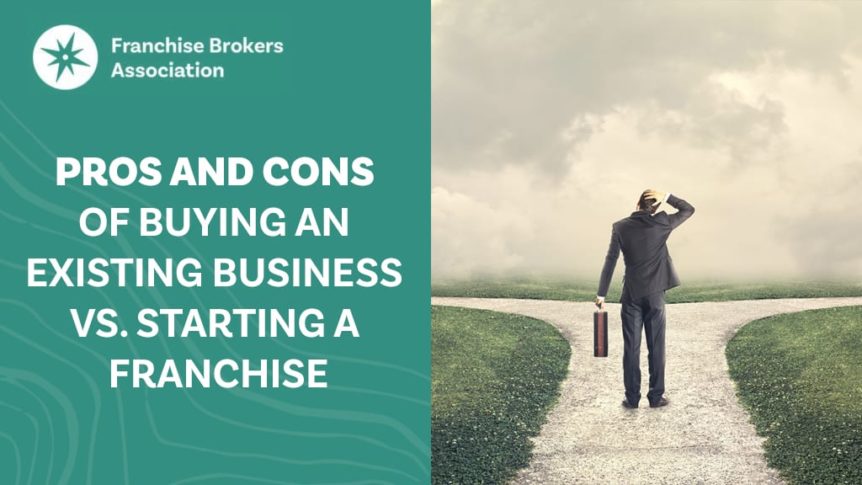Written and Sourced From Franchiseba.com
Sabrina Wall, CEO August 6, 2020
Many prospective business owners face this question when considering their next investment, is it better to buy an existing business or start with a new franchise? There are many pros and cons to both, and we want to review those with you so that you are as educated as possible when beginning a new path to business ownership.
Let’s start with the pros to buying an existing business.

There are benefits such as the fact that the business is already up and running, which means that you save time in the start-up phase. In addition, there will already be employees and customers to operate the business with. There will be more financing ease. If you are investing in a profitable business then lenders are less stringent on restrictions.
It must be noted that this will only be available to a profitable business. If the business is not profitable then it could be next to impossible to find funding. The last advantage of buying an existing business is that the product or service will already be operational on the market. With that information, you can determine if the business would be viable in your area.
Now that we’ve considered the pros, let’s dive into the cons.
The seller’s market can be inconsistent and emotional. Most sellers have an exaggerated view of the value of the business. They also put a great deal of effort into the business, so that pride of ownership is there and it makes it harder to get them to accept a more favorable (to you) term.
The value of the business can also fluctuate wildly, depending on the balance sheet, cash flow, assets, and the original owner’s emotional disposition. It can also be difficult to find the right business for you in the right area, and with the right financials.
So many variables have to be lined up appropriately in order to get what you want, such as business type, business price, cashflow desired, area, business value, etc. It is not uncommon to hear that a search can extend past 2 years. In fact, in the business brokerage world, they do not lack buyers. They actually have lots and lots of them because of this reason. It’s simply hard to find good businesses to buy which are properly priced.
What does the businesses financial records look like?

Many business owners don’t keep good records or books. It’s common for the seller to withhold financial statements or tax returns because they don’t have them ready yet. That’s a very bad sign.
Records should be maintained on a daily basis and should be available at any point in time upon request. As a business owner, don’t make this mistake. Financials are the one true indicator that shows if you are making money and managing your business properly. Business owners should be able to produce financials immediately. The longer financials are delayed, the less accurate they will be.
In addition, there are often hidden problems the new owner wasn’t aware of when they purchased, which they have to now deal with. Many existing businesses are trying to offload their problem they couldn’t fix– on someone else. You really have to be careful when buying an existing business.
Often the business could have a bad reputation, liabilities were not stated, legal issues were not disclosed, there was a misrepresentation of financial information, or the need for repairs were glossed over. In this situation, you may have legal recourse, but legal fees can quickly add up, making it difficult to get retribution for the misstatements.
How do you compare to the original owner?

Further questions arise when in consideration of buying an existing business.
Will the value continue to be there for the new owner? Will employees stay? You usually don’t get to meet them prior to the sale. Also, will you be able to produce at the same level as the previous owner? These are valid questions to ask.
Did we mention that as a business owner, you would be responsible for redefining the rules and culture of the company? Employees aren’t robots. They frequently resist change and have emotions around the previous owner and their treatment. Whether these emotions are good or bad, they don’t always translate well to the new owner. It’s common to have to replace the entire staff with an existing business.
Time is money.
How much time will it take you to get into the swing of things?
It’s important to consider how long it will take you to learn the business. You don’t have ongoing support. The new owner wants to get out and when you have questions, will they actually be there to help you? Especially if they were hiding problems under the surface, it seems unlikely.
A business is like a child in many ways. You have to nurture it, pay attention to it, guide it in the right direction and be there to help it thrive. If the previous owners had different values than you, different guidance than you, and didn’t pay attention to the business the way you would, it can lead to a life resembling living with an unruly teenager.
Let’s consider the pros of starting a franchise.
#1 You are not alone and have the support of the franchisor.
There is a large support structure of the franchise systems employees and other franchises to help you. You can receive assistance with a marketing strategy, analysis of profitability, setting performance goals, growth, research and development, technical questions, and staff training. Starting a new franchise is a quick selection process, as it typically takes 2-6 months depending on your needs and goals. It is easier to find something that fits the new owner because there is more to choose from.
#2 You have clarity into starting the business – you CAN plan ahead!

Did you know that starting a new franchise location can be less expensive than a cashflow positive existing business? That’s because instead of spending the 2 years on searching, you can spend a shorter window launching a healthy business.
This means your time to break even can often be faster because you are not carrying the same debt load compared to an existing business.
When buying a franchise, 64% of franchises offer a financial performance representation in their disclosure document. That disclosure is extremely useful because it shows the past performance of other others in the system. Buyers often have financials for the performance of the whole system, which can give a better understanding of the opportunities and benchmarks of high, mid, and low performance within the system.
There are often more detailed insights about the true track record and performance of the business model, the support structure, and the partners you are working within the franchise system. Franchising is regulated. There are guidelines in the franchise system that must be followed in the way of disclosure. That disclosure is protection for buyers and helps them to be clear about the opportunities they are considering. Having clarity in buying decision matter. It can be difficult to get the same clarity from an existing business.
#3 Did we say that you are not alone? Franchising is a partnership.
A big factor is that you’re not doing everything. The franchise system is a partner to you to help you with many functions of your business. Marketing, sales, processes, operations, administration, technology, legal, etc. You simply don’t have as much work when you are running a franchise as you do with an independent business.

There are a few cons to mention when starting a franchise. It is a partnership. Therefore, you want to ensure you are aligned with the culture of the franchise system.
Not all franchises are good, and there are many high-risk systems that should be avoided. At FBA, we can help teach you what to look out for. The terms of the franchise are designed to protect the integrity of the system and the franchise. It’s important to ensure you are comfortable with the terms and the restrictions of the terms.
There is a share of fees, as franchises have fees that are paid to the franchise system for their support and ongoing services. You have to make sure the numbers work out for you and that the fees are consistent with the value you are being provided.
#4 FBA Brokers help match you with franchises based on proven track records – not marketing materials.
“Trust but verify,” is an age old adage which is appropriate for the world of franchise sales. Any information you are given for a franchise should be consistent with the franchise disclosure document. Often the franchise sales process highlights only the good stuff. It’s important to work with professionals who give you the full story and that the story aligns with the regulated disclosure.
You can be really savvy in the franchise sales process if you do it well. Beware of financial performance representations inconsistent with the FDD, and claims of support or services which are not stated in that disclosure. “Get it in writing,” is a good rule of thumb.
When you align with the franchise, you are a small business tapping into a more powerful, established, knowledgeable and connected organization to help you grow your business faster and with less risk. You have to understand the impact and importance of selecting the proper system and doing it in a way that is going to launch your business on the most successful trajectory.
Contact us if you are ready to find good franchises. Let FBA be the guide through your franchising journey. Call 970.640.1804.

